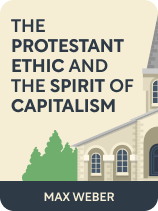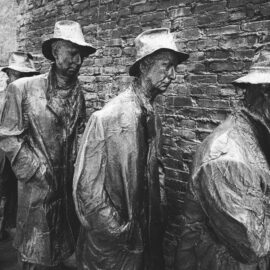

This article is an excerpt from the Shortform book guide to "The Protestant Ethic and the Spirit of Capitalism" by Max Weber. Shortform has the world's best summaries and analyses of books you should be reading.
Like this article? Sign up for a free trial here.
What are some of the best Max Weber quotes from The Protestant Ethic? What captures Weber’s message?
The Protestant Ethic and the Spirit of Capitalism discusses the socio-economic and religious roots of modern capitalism—and of our productivity-focused culture. Max Weber argues that the Protestant Reformation changed how people lived, worked, and used their money.
Continue reading for six quotes from this classic work.
Quotes From The Protestant Ethic
These Max Weber quotes from The Protestant Ethic will give you an idea of his argument. We’ve provided them along with a bit of context and explanation to help you know what Weber was getting at.
“The monastic life is not only quite devoid of value as a means of justification before God, but he also looks upon its renunciation of the duties of this world as the product of selfishness, withdrawing from temporal obligations.”
Weber explains that Martin Luther saw monkhood as a devilish path. He felt that monks shut themselves away from the world and choose not to contribute to secular, practical life. Weber argues that Protestants began to live ascetic, systematic lives in order to attain the state of grace—following the example of Catholic monks, except in the secular world.
“Wealth is thus bad ethically only in so far as it is a temptation to idleness and sinful enjoyment of life, and its acquisition is bad only when it is with the purpose of later living merrily and without care.”
Weber writes that prominent English and Puritan theologian Richard Baxter taught that becoming wealthy was justified under the right conditions, reasoning as follows:
- If you became wealthy in the course of working your calling for God’s glory, that meant that God favored you.
- Further, if God presented you with the chance to profit, it was your moral duty to take advantage of the opportunity.
“Calvinist believers were psychologically isolated. Their distance from God could only be precariously bridged, and their inner tensions only partially relieved, by unstinting, purposeful labor.”
Weber stresses that John Calvin’s doctrine of predestination caused people to feel profoundly anxious and alone. Since nobody knew their status, people couldn’t trust each other—nobody wanted to associate with the potentially damned. This intense inner isolation was the psychological backdrop of a Calvinist’s life.
In practice, Calvin’s answer didn’t do much to assuage people’s anxieties, so Calvinist pastors tried to give better answers. Weber says that they gave two main pieces of advice:
- #1: You must regard yourself as elect—it’s your moral duty to have faith.
- #2: You must work tirelessly in your calling.
“The Puritans wanted to be men of the calling. We, on the other hand, must be.”
Weber laments the state of the modern world. He notes that, while the Protestants chose to live as they did, we now all have to. The capitalist world system has become so large that we now must submit to its pressures. Either you live a rational, systematic life, or you’ll end up on the bottom of the economic ladder.
“In [Richard] Baxter’s view, concern for outward possessions should sit lightly on the shoulders of his saints ‘like a thin cloak which can be thrown off at any time.’ But fate decreed that the cloak should become a shell as hard as steel.”
Our concern for material possessions rather than rich inner lives has become what Weber refers to as an “iron cage,” and he laments that we’ll be trapped in a drab capitalist world until we run out of fossil fuels and the whole system is forced to change.
“Specialists without spirit, sensualists without heart; this nullity imagines that it has attained a level of civilization never before achieved.”
In Weber’s view, we’ve lost the magic of earlier ages. The world has become a “disenchanted” place, and everyone lives mechanically and without wonder.

———End of Preview———
Like what you just read? Read the rest of the world's best book summary and analysis of Max Weber's "The Protestant Ethic and the Spirit of Capitalism" at Shortform.
Here's what you'll find in our full The Protestant Ethic and the Spirit of Capitalism summary:
- How the Protestant way of life lead to modern capitalism
- The history of the 16th-century Protestant reformation
- Why the Protestants were so distinctly prosperous






